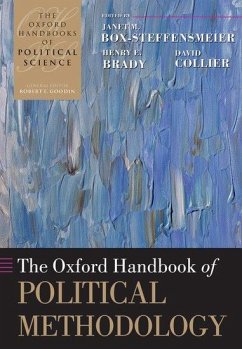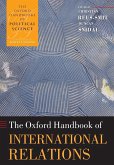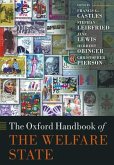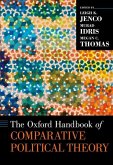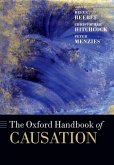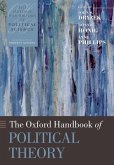Janet M Box-Steffensmeier
Oxford Handbook of Political Methodology
Herausgeber: Brady, Henry E; Collier, David
Janet M Box-Steffensmeier
Oxford Handbook of Political Methodology
Herausgeber: Brady, Henry E; Collier, David
- Broschiertes Buch
- Merkliste
- Auf die Merkliste
- Bewerten Bewerten
- Teilen
- Produkt teilen
- Produkterinnerung
- Produkterinnerung
The Oxford Handbooks of Political Science are the essential guide to the state of political science today. With engaging contributions from major international scholars The Oxford Handbook of Political Methodology provides the key point of reference for anyone working throughout the discipline.
Andere Kunden interessierten sich auch für
![Oxford Handbook of International Relations Oxford Handbook of International Relations]() Christian Reus-Smit / Duncan Snidal (Hrsg.)Oxford Handbook of International Relations71,99 €
Christian Reus-Smit / Duncan Snidal (Hrsg.)Oxford Handbook of International Relations71,99 €![The Oxford Handbook of the Welfare State The Oxford Handbook of the Welfare State]() The Oxford Handbook of the Welfare State47,99 €
The Oxford Handbook of the Welfare State47,99 €![The Oxford Handbook of Political Executives The Oxford Handbook of Political Executives]() The Oxford Handbook of Political Executives224,99 €
The Oxford Handbook of Political Executives224,99 €![Oxford Handbook of Comparative Political Theory Oxford Handbook of Comparative Political Theory]() Oxford Handbook of Comparative Political Theory246,99 €
Oxford Handbook of Comparative Political Theory246,99 €![The Oxford Handbook of Causation The Oxford Handbook of Causation]() The Oxford Handbook of Causation77,99 €
The Oxford Handbook of Causation77,99 €![The Oxford Handbook of Political Behavior The Oxford Handbook of Political Behavior]() The Oxford Handbook of Political Behavior47,99 €
The Oxford Handbook of Political Behavior47,99 €![The Oxford Handbook of Political Theory The Oxford Handbook of Political Theory]() John S Dryzek (Professor of Social and Australian Political TheoryThe Oxford Handbook of Political Theory47,99 €
John S Dryzek (Professor of Social and Australian Political TheoryThe Oxford Handbook of Political Theory47,99 €-
-
-
The Oxford Handbooks of Political Science are the essential guide to the state of political science today. With engaging contributions from major international scholars The Oxford Handbook of Political Methodology provides the key point of reference for anyone working throughout the discipline.
Hinweis: Dieser Artikel kann nur an eine deutsche Lieferadresse ausgeliefert werden.
Hinweis: Dieser Artikel kann nur an eine deutsche Lieferadresse ausgeliefert werden.
Produktdetails
- Produktdetails
- Oxford Handbooks
- Verlag: Oxford University Press
- Seitenzahl: 896
- Erscheinungstermin: 29. Juli 2010
- Englisch
- Abmessung: 248mm x 172mm x 57mm
- Gewicht: 1516g
- ISBN-13: 9780199585564
- ISBN-10: 0199585563
- Artikelnr.: 29730659
- Herstellerkennzeichnung
- Libri GmbH
- Europaallee 1
- 36244 Bad Hersfeld
- gpsr@libri.de
- Oxford Handbooks
- Verlag: Oxford University Press
- Seitenzahl: 896
- Erscheinungstermin: 29. Juli 2010
- Englisch
- Abmessung: 248mm x 172mm x 57mm
- Gewicht: 1516g
- ISBN-13: 9780199585564
- ISBN-10: 0199585563
- Artikelnr.: 29730659
- Herstellerkennzeichnung
- Libri GmbH
- Europaallee 1
- 36244 Bad Hersfeld
- gpsr@libri.de
Janet Box-Steffensmeier is the Vernal Riffe Professor of Political Science, Director of the Program in Statistics and Methodology, and courtesy faculty of Sociology at the Ohio State University. She holds a B.A. in mathematics and political science from Coe College (1988), and a Ph.D. in Political Science from the University of Texas at Austin (1993). Henry Brady is Professor of Political Science and Public Policy at University of California, Berkeley. He received his Ph.D. in Economics and Political Science from MIT in 1980. His areas of interest include Quantitative Methodology, American and Canadian Politics, and Political Behavior. He teaches undergraduate courses on political participation and party systems and graduate courses on advanced quantitative methodology. David Collier is Professor of Political Science at University of California, Berkeley and former President of the American Political Science Association. His fields are comparative politics, Latin American politics, and methodology. His latest book is Rethinking Social Inquiry: Diverse Tools, Shared Standards (Rowman & Littlefield, 2004), of which he is co-editor and co-author with his Berkeley colleague Henry E. Brady.
* Part I: Introduction
* 1: Janet Box-Steffensmeier, Henry Brady, David Collier: Political
Science Methodology
* 2: Russell Hardin: Normative Methodology
* Part II: Approaches to Social Science Methodology
* 3: Mark Bevir: Meta-methodology: Clearing the Underbrush
* 4: Scott de Marchi and Scott E. Page: Agent-based Modeling
* Part III: Concepts and Measurement
* 5: Gary Goertz: Concepts, Theories, and Numbers: A Checklist for
Constructing, Evaluating, and Using Concepts or Quantitative Measures
* 6: Simon Jackman: Measurement
* 7: David Collier, Jody LaPorte, and Jason Seawright: Typologies:
Forming Concepts and Creating Catagorical Variables
* 8: Charles C. Ragin: Measurement versus Calibration: A Set-theoretic
Approach
* 9: Keith T. Poole: The Evolving Influence of Psychometrics in
Political Science
* Part IV: Causality and Explanation in Social Research
* 10: Henry E. Brady: Causation and Explanation in Social Science
* 11: Jasjeet S.Sekhon: The Neyman-Rubin Model of Causal Inference and
Estimation via Matching Methods
* 12: David A. Freedman: On Types of Scientific Enquiry: The Role of
Qualitative Reasoning
* 13: Peter Hedstrom: Studying Mechanisms to Strengthen Causal
Inferences in Quantitative Research
* Part V: Experiments, Quasi-experiments and Natural Experiments
* 14: Rebecca B. Morton and Kenneth C. Williams: Experimentation in
Political Science
* 15: Alan S. Gerber and Donald P. Green: Field Experiments and Natural
Experiments
* Part VI: Quantitative Tools for Descriptive and Causal Inference:
General Methods
* 16: Richard Johnston: Survey Methodology
* 17: John E. Jackson: Endogeneity and Structural Equation Estimation
in Political Science
* 18: Kenneth A. Bollen, Sophia Rabe-Hesketh, and Anders Skrondal:
Structural Equation Models
* 19: Jon C. Pevehouse and Jason D. Brozek: Time-series Analysis
* 20: Nathaniel Beck: Time-series Cross-section Methods
* 21: Andrew D. Martin: Bayesian Analysis
* Part VII: Quantitative Tools for Descriptive and Causal Inference:
Special Topics
* 22: Garrett Glasgow and R. Michael Alvarez: Discrete Choice Methods
* 23: Jonathan Golub: Survival Analysis
* 24: Wendy K. Tam Cho and Charles F. Manski: Cross-level/Ecological
Inference
* 25: Robert J. Franzese Jr, and Jude C. Hays: Empirical Models of
Spatial Interdependence
* 26: Bradford S. Jones: Multilevel Models
* Part VIII: Qualitative Tools for Descriptive and Causal Inference
* 27: Jack S. Levy: Counterfactuals and Case Studies
* 28: John Gerring: Case Selection for Case-study Analysis: Qualitative
and Quantitative Techniques
* 29: Brian C. Rathbun: Interviewing and Qualitative Field Methods:
Pragmatism and Practicalities
* 30: Andrew Bennett: Process Tracing: A Bayesian Perspective
* 31: Benoit Rihoux: Case-oriented Configurational Research:
Qualitative Comparative Analysis (QCA), Fuzzy Sets, and Related
Techniques
* 32: James Mahoney and P. Larkin Terrie: Comparative-historical
Analysis in Contemporary Political Science
* 33: James D. Fearon and David D. Laitin: Integrating Qualitative and
Quantitative Methods
* Part IX: Organizations, Institutions, and Movements in the Field of
Methodology
* 34: David Collier and Colin Elman: Qualitative and Multimethod
Research: Organizations, Publication, and Reflections on Integration
* 35: Charles H. Franklin: Quantitative Methodology
* 36: Michael S. Lewis-Beck: Forty Years of Publishing in Quantitative
Methodology
* 37: John H. Aldrich, James E. Alt, and Arthur Lupia: The EITM
Approach: Origins and Interpretations
* Index
* 1: Janet Box-Steffensmeier, Henry Brady, David Collier: Political
Science Methodology
* 2: Russell Hardin: Normative Methodology
* Part II: Approaches to Social Science Methodology
* 3: Mark Bevir: Meta-methodology: Clearing the Underbrush
* 4: Scott de Marchi and Scott E. Page: Agent-based Modeling
* Part III: Concepts and Measurement
* 5: Gary Goertz: Concepts, Theories, and Numbers: A Checklist for
Constructing, Evaluating, and Using Concepts or Quantitative Measures
* 6: Simon Jackman: Measurement
* 7: David Collier, Jody LaPorte, and Jason Seawright: Typologies:
Forming Concepts and Creating Catagorical Variables
* 8: Charles C. Ragin: Measurement versus Calibration: A Set-theoretic
Approach
* 9: Keith T. Poole: The Evolving Influence of Psychometrics in
Political Science
* Part IV: Causality and Explanation in Social Research
* 10: Henry E. Brady: Causation and Explanation in Social Science
* 11: Jasjeet S.Sekhon: The Neyman-Rubin Model of Causal Inference and
Estimation via Matching Methods
* 12: David A. Freedman: On Types of Scientific Enquiry: The Role of
Qualitative Reasoning
* 13: Peter Hedstrom: Studying Mechanisms to Strengthen Causal
Inferences in Quantitative Research
* Part V: Experiments, Quasi-experiments and Natural Experiments
* 14: Rebecca B. Morton and Kenneth C. Williams: Experimentation in
Political Science
* 15: Alan S. Gerber and Donald P. Green: Field Experiments and Natural
Experiments
* Part VI: Quantitative Tools for Descriptive and Causal Inference:
General Methods
* 16: Richard Johnston: Survey Methodology
* 17: John E. Jackson: Endogeneity and Structural Equation Estimation
in Political Science
* 18: Kenneth A. Bollen, Sophia Rabe-Hesketh, and Anders Skrondal:
Structural Equation Models
* 19: Jon C. Pevehouse and Jason D. Brozek: Time-series Analysis
* 20: Nathaniel Beck: Time-series Cross-section Methods
* 21: Andrew D. Martin: Bayesian Analysis
* Part VII: Quantitative Tools for Descriptive and Causal Inference:
Special Topics
* 22: Garrett Glasgow and R. Michael Alvarez: Discrete Choice Methods
* 23: Jonathan Golub: Survival Analysis
* 24: Wendy K. Tam Cho and Charles F. Manski: Cross-level/Ecological
Inference
* 25: Robert J. Franzese Jr, and Jude C. Hays: Empirical Models of
Spatial Interdependence
* 26: Bradford S. Jones: Multilevel Models
* Part VIII: Qualitative Tools for Descriptive and Causal Inference
* 27: Jack S. Levy: Counterfactuals and Case Studies
* 28: John Gerring: Case Selection for Case-study Analysis: Qualitative
and Quantitative Techniques
* 29: Brian C. Rathbun: Interviewing and Qualitative Field Methods:
Pragmatism and Practicalities
* 30: Andrew Bennett: Process Tracing: A Bayesian Perspective
* 31: Benoit Rihoux: Case-oriented Configurational Research:
Qualitative Comparative Analysis (QCA), Fuzzy Sets, and Related
Techniques
* 32: James Mahoney and P. Larkin Terrie: Comparative-historical
Analysis in Contemporary Political Science
* 33: James D. Fearon and David D. Laitin: Integrating Qualitative and
Quantitative Methods
* Part IX: Organizations, Institutions, and Movements in the Field of
Methodology
* 34: David Collier and Colin Elman: Qualitative and Multimethod
Research: Organizations, Publication, and Reflections on Integration
* 35: Charles H. Franklin: Quantitative Methodology
* 36: Michael S. Lewis-Beck: Forty Years of Publishing in Quantitative
Methodology
* 37: John H. Aldrich, James E. Alt, and Arthur Lupia: The EITM
Approach: Origins and Interpretations
* Index
* Part I: Introduction
* 1: Janet Box-Steffensmeier, Henry Brady, David Collier: Political
Science Methodology
* 2: Russell Hardin: Normative Methodology
* Part II: Approaches to Social Science Methodology
* 3: Mark Bevir: Meta-methodology: Clearing the Underbrush
* 4: Scott de Marchi and Scott E. Page: Agent-based Modeling
* Part III: Concepts and Measurement
* 5: Gary Goertz: Concepts, Theories, and Numbers: A Checklist for
Constructing, Evaluating, and Using Concepts or Quantitative Measures
* 6: Simon Jackman: Measurement
* 7: David Collier, Jody LaPorte, and Jason Seawright: Typologies:
Forming Concepts and Creating Catagorical Variables
* 8: Charles C. Ragin: Measurement versus Calibration: A Set-theoretic
Approach
* 9: Keith T. Poole: The Evolving Influence of Psychometrics in
Political Science
* Part IV: Causality and Explanation in Social Research
* 10: Henry E. Brady: Causation and Explanation in Social Science
* 11: Jasjeet S.Sekhon: The Neyman-Rubin Model of Causal Inference and
Estimation via Matching Methods
* 12: David A. Freedman: On Types of Scientific Enquiry: The Role of
Qualitative Reasoning
* 13: Peter Hedstrom: Studying Mechanisms to Strengthen Causal
Inferences in Quantitative Research
* Part V: Experiments, Quasi-experiments and Natural Experiments
* 14: Rebecca B. Morton and Kenneth C. Williams: Experimentation in
Political Science
* 15: Alan S. Gerber and Donald P. Green: Field Experiments and Natural
Experiments
* Part VI: Quantitative Tools for Descriptive and Causal Inference:
General Methods
* 16: Richard Johnston: Survey Methodology
* 17: John E. Jackson: Endogeneity and Structural Equation Estimation
in Political Science
* 18: Kenneth A. Bollen, Sophia Rabe-Hesketh, and Anders Skrondal:
Structural Equation Models
* 19: Jon C. Pevehouse and Jason D. Brozek: Time-series Analysis
* 20: Nathaniel Beck: Time-series Cross-section Methods
* 21: Andrew D. Martin: Bayesian Analysis
* Part VII: Quantitative Tools for Descriptive and Causal Inference:
Special Topics
* 22: Garrett Glasgow and R. Michael Alvarez: Discrete Choice Methods
* 23: Jonathan Golub: Survival Analysis
* 24: Wendy K. Tam Cho and Charles F. Manski: Cross-level/Ecological
Inference
* 25: Robert J. Franzese Jr, and Jude C. Hays: Empirical Models of
Spatial Interdependence
* 26: Bradford S. Jones: Multilevel Models
* Part VIII: Qualitative Tools for Descriptive and Causal Inference
* 27: Jack S. Levy: Counterfactuals and Case Studies
* 28: John Gerring: Case Selection for Case-study Analysis: Qualitative
and Quantitative Techniques
* 29: Brian C. Rathbun: Interviewing and Qualitative Field Methods:
Pragmatism and Practicalities
* 30: Andrew Bennett: Process Tracing: A Bayesian Perspective
* 31: Benoit Rihoux: Case-oriented Configurational Research:
Qualitative Comparative Analysis (QCA), Fuzzy Sets, and Related
Techniques
* 32: James Mahoney and P. Larkin Terrie: Comparative-historical
Analysis in Contemporary Political Science
* 33: James D. Fearon and David D. Laitin: Integrating Qualitative and
Quantitative Methods
* Part IX: Organizations, Institutions, and Movements in the Field of
Methodology
* 34: David Collier and Colin Elman: Qualitative and Multimethod
Research: Organizations, Publication, and Reflections on Integration
* 35: Charles H. Franklin: Quantitative Methodology
* 36: Michael S. Lewis-Beck: Forty Years of Publishing in Quantitative
Methodology
* 37: John H. Aldrich, James E. Alt, and Arthur Lupia: The EITM
Approach: Origins and Interpretations
* Index
* 1: Janet Box-Steffensmeier, Henry Brady, David Collier: Political
Science Methodology
* 2: Russell Hardin: Normative Methodology
* Part II: Approaches to Social Science Methodology
* 3: Mark Bevir: Meta-methodology: Clearing the Underbrush
* 4: Scott de Marchi and Scott E. Page: Agent-based Modeling
* Part III: Concepts and Measurement
* 5: Gary Goertz: Concepts, Theories, and Numbers: A Checklist for
Constructing, Evaluating, and Using Concepts or Quantitative Measures
* 6: Simon Jackman: Measurement
* 7: David Collier, Jody LaPorte, and Jason Seawright: Typologies:
Forming Concepts and Creating Catagorical Variables
* 8: Charles C. Ragin: Measurement versus Calibration: A Set-theoretic
Approach
* 9: Keith T. Poole: The Evolving Influence of Psychometrics in
Political Science
* Part IV: Causality and Explanation in Social Research
* 10: Henry E. Brady: Causation and Explanation in Social Science
* 11: Jasjeet S.Sekhon: The Neyman-Rubin Model of Causal Inference and
Estimation via Matching Methods
* 12: David A. Freedman: On Types of Scientific Enquiry: The Role of
Qualitative Reasoning
* 13: Peter Hedstrom: Studying Mechanisms to Strengthen Causal
Inferences in Quantitative Research
* Part V: Experiments, Quasi-experiments and Natural Experiments
* 14: Rebecca B. Morton and Kenneth C. Williams: Experimentation in
Political Science
* 15: Alan S. Gerber and Donald P. Green: Field Experiments and Natural
Experiments
* Part VI: Quantitative Tools for Descriptive and Causal Inference:
General Methods
* 16: Richard Johnston: Survey Methodology
* 17: John E. Jackson: Endogeneity and Structural Equation Estimation
in Political Science
* 18: Kenneth A. Bollen, Sophia Rabe-Hesketh, and Anders Skrondal:
Structural Equation Models
* 19: Jon C. Pevehouse and Jason D. Brozek: Time-series Analysis
* 20: Nathaniel Beck: Time-series Cross-section Methods
* 21: Andrew D. Martin: Bayesian Analysis
* Part VII: Quantitative Tools for Descriptive and Causal Inference:
Special Topics
* 22: Garrett Glasgow and R. Michael Alvarez: Discrete Choice Methods
* 23: Jonathan Golub: Survival Analysis
* 24: Wendy K. Tam Cho and Charles F. Manski: Cross-level/Ecological
Inference
* 25: Robert J. Franzese Jr, and Jude C. Hays: Empirical Models of
Spatial Interdependence
* 26: Bradford S. Jones: Multilevel Models
* Part VIII: Qualitative Tools for Descriptive and Causal Inference
* 27: Jack S. Levy: Counterfactuals and Case Studies
* 28: John Gerring: Case Selection for Case-study Analysis: Qualitative
and Quantitative Techniques
* 29: Brian C. Rathbun: Interviewing and Qualitative Field Methods:
Pragmatism and Practicalities
* 30: Andrew Bennett: Process Tracing: A Bayesian Perspective
* 31: Benoit Rihoux: Case-oriented Configurational Research:
Qualitative Comparative Analysis (QCA), Fuzzy Sets, and Related
Techniques
* 32: James Mahoney and P. Larkin Terrie: Comparative-historical
Analysis in Contemporary Political Science
* 33: James D. Fearon and David D. Laitin: Integrating Qualitative and
Quantitative Methods
* Part IX: Organizations, Institutions, and Movements in the Field of
Methodology
* 34: David Collier and Colin Elman: Qualitative and Multimethod
Research: Organizations, Publication, and Reflections on Integration
* 35: Charles H. Franklin: Quantitative Methodology
* 36: Michael S. Lewis-Beck: Forty Years of Publishing in Quantitative
Methodology
* 37: John H. Aldrich, James E. Alt, and Arthur Lupia: The EITM
Approach: Origins and Interpretations
* Index

